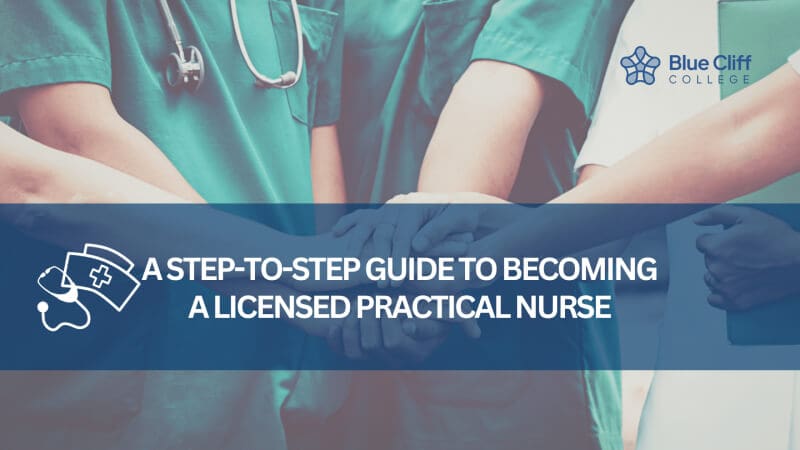There are so many career options when it comes to the healthcare field. One of the most popular careers that those who love caring for people choose is a licensed practical nurse. Let’s take a look at what a licensed practical nurse is and does, the education required, and their salary.
Table of Contents
What Is a Licensed Practical Nurse?
An LPN is a type of nurse that is responsible for providing patients with essential care. They have very specific education, training, and certifications to perform their duties and worth with RNs and doctors.
What Does an LPN Do?
LPNs perform a variety of duties, including assisting patients with basic care, like:
- Eating
- Dressing
- Bathing
- Toileting
There are also times when LPNS perform other duties, such as:
- Administering medications
- Taking blood pressure
- Inserting catheters
- Recording vital signs
Finally, a huge component of the duties of an LPN involves keeping up communication with:
- Doctors
- Other nurses
- The patient
- The patient’s family
What Is the Difference Between an LPN and an RN?
An LPN and an RN are both types of nurses, but what’s the difference? An LPN works under the supervision of an RN, or registered nurse. Being an RN requires more education than becoming an LPN, and with that, they have more responsibilities, like:
- LPN and healthcare aides management
- Treating patients
- Creating and coordinating care plans
- Working closely with doctors for the best results
RPNs also have a higher salary, averaging around $77,600 annually. Ready to make a difference in healthcare? Embrace your passion for nursing and enroll in our transformative LPN program today – your journey to a fulfilling career starts here!
What Is the Difference Between an LPN and an LVN?
In a practical sense, there is no difference between an LPN and an LVN. They go through the same education, training, and certifications, as well as perform similar duties. The only distinction is the geographical location of the person who’s referring to the position. In Texas and California, they are referred to as LVN, or licensed vocational nurses. In every other state, they are referred to as an LPN, or licensed practical nurses.
Six Myths About LPNs Debunked
What Skills Does an LPN Need?
Being an LPN isn’t for everyone. There are certain skills and qualities that are required to thrive in the position.
- Excellent Communication Communication is key in the healthcare field in general. For LPNs, they need to be able to effectively convey important information to doctors, patients, and their families. They also need to have a compassionate bedside manner, as they spend the majority of their time taking care of their patients.
- Strong Organizational Skills LPNs work in an incredibly fast-paced environment with others’ well-being depending on them performing their duties efficiently. An organization system needs to be in place in order to stay on track with all of the many duties and information that an LPN comes across in a day.
- Tolerance For Bodily Fluids LPNs will deal with blood, bodily fluids, and a variety of unpleasant sensations and smells on a daily basis. Being able to handle these aspects of the position is vital to successfully perform their duties as an LPN.
Where Can an LPN Work?
There are a variety of workplaces that an LPN can choose to build their career. These include:
- Hospitals
- Nursing Homes
- Doctor’s Offices
- Private Care
- Other Healthcare Facilities
What is the Salary of a Practical Nurse?
As of 2021, the median annual salary for an LPN is around $48,070. This can vary depending on the area. For example, LPNs in California are at the very top of the earning potential scale with an average annual salary of $65,140. On the other hand, the lowest 10 percent of the scale can earn less than $37,150 per year.
Steps to Becoming a Licensed Practical Nurse
One advantage of choosing the career path of a licensed practical nurse is that the path toward achieving your goals is very straightforward.
1. Choose Your Program
There are a couple of options when it comes to choosing your LPN program. The first is obtaining a certification from a specialized program that specifically only goes over pertinent information for becoming an LPN. This path is much quicker, but the credits in these programs do not transfer, so they will be unhelpful in furthering education toward becoming an RN. The second is earning an associate’s degree. This path is slower, but the credits do transfer to further education courses. There are also some employers that look specifically for a degree over a certification.
2. Get Your Education
The next step is finding a school with the program that you want that also meets your state’s requirements for becoming an LPN. Once you have applied and are accepted, you just need to focus on your coursework and your goals to put yourself in the best position for your exam and career.
3. Pass the Exam
While your program gives you the knowledge to become an LPN, it does not actually give you a license. In order to earn your license, you need to take the National Council Licensure Examination for Practical Nurses. The test is multiple-choice with between 85 to 205 questions. If you don’t pass the first time, you may try again after a 45 to 90-day wait.
4. Get a Job
Once you are licensed, one of the final steps is landing your preferred job. You may do this right after your exam, or you could choose to specialize with an additional certification. Some fields you can specialize in include:
- Gerontology
- Long-Term Care
- Pharmacology
- Hospice
- IV Therapy
- Immunization
Take the leap towards becoming a skilled nurse and embark on a journey that changes lives – including yours!
How Long Does it Take to Become an LPN?
How long it takes to become an LPN depends on the educational program that is selected. If you choose a certification, becoming an LPN can be achieved in as little as nine months. If you choose to earn an associate’s degree, it will take a little longer, ranging from one and a half years to two.
What Impact Has COVID Had on Nursing?
COVID put a great strain on the entire healthcare industry. Nursing, in particular, went through a lot of hardships in trying to take care of and make difficult decisions about the influx of patients that acquired the deadly disease. They were not only overworked, but they were required to put themselves in harm’s way every day due to the exposure to COVID. This resulted in a severely decreased nursing workforce that is now in recovery. The demand for licensed nurses is higher than ever.
Blue Cliff College
Do you have a passion for taking care of others? Becoming an LPN may be a great option for you. Not only will you be able to enter the workforce quickly with our diploma program, but the position is also in high demand. At Blue Cliff College, you can learn everything you need to pass your NCLEX-RN exam and start your dream career. Enroll now or contact us to learn more about this program and others that are offered by Blue Cliff College.
FAQs About Becoming an LPN
- What Does an LPN Do? An LPN is responsible for providing patients with essential care.
- What is the Highest Paying LPN Job? Some of the highest-paying LPN jobs are in occupational health and rehabilitation with an average salary of $50,00.
- Is an LPN Program Difficult? LPN programs can be challenging, as they teach a lot of vital information about the human body.
- What is the difference between an LPN and a Registered Nurse? A registered nurse requires more education and has more medically involved duties.
- What is the Hardest Thing About Being an LPN? What is the hardest aspect of being an LPN depends on the person. For some, it may be dealing with bodily functions. For others, it could be communicating with the patient’s family.
- Do LPNs Need to be Good at Math? Yes. Math is essential to being an LPN.
- Is Becoming an LPN Worth it? Yes. Being an LPN is a rewarding career for most.
- How Does Covid Affect Healthcare Workers? COVID put a big strain on healthcare workers during its peak.





